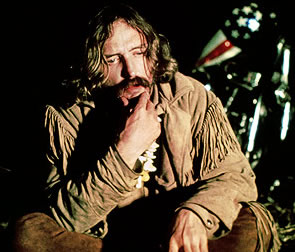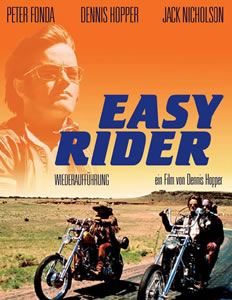
arts
Not So Easy Rider
 It’s 1969. Lots of baby boomers are in rebellion: burning flags and bras, escaping to communes, ingesting everything, dressing like hippie freaks, blowing out their eardrums on rock n’ roll and making free love. Easy Rider roars across the pop culture screen.
It’s 1969. Lots of baby boomers are in rebellion: burning flags and bras, escaping to communes, ingesting everything, dressing like hippie freaks, blowing out their eardrums on rock n’ roll and making free love. Easy Rider roars across the pop culture screen.
It was an “easy,” if painful, experience for boomers but a hard one for their parents. Henry Fonda, the venerable father of the film’s co-star, couldn’t even find a plot. “What does the movie mean?” he asked in bewilderment.
There was a plot of sorts: two biker hippie drug dealers make a big score and travel south to retire in Florida. Along the way, the movie tag says “…they went looking for America. And they couldn’t find it.” What they do find is a dysfunctional mixture of hippie communes, small town bigotry, and drugs.
New York Times critic Vincent Canby didn’t like the tone: “Right away, you know that something superior is up, that somebody is making a statement…that it’s going to put down the whole rotten scene. What scene?…Man, I can’t tell you if you don’t know. What I mean to say is, if you don’t groove, you don’t groove.” Canby describes Peter Fonda and Dennis Hopper as “vacuous, romantic symbols.”
Old Hollywood that produced the 1950s classics was giving way to young avant guard film makers free from censorship codes and traditional ideas. This was a boomer counterculture critique that reflected growing  disillusionment with the Establishment, however defined. From the rebellion of Bonnie & Clyde to the detached stupor of The Graduate, from the gritty sex in Midnight Cowboy to the malaise of The Big Chill, here were the themes, dreams and nightmares of the boomer generation. The finale of Easy Rider is a nightmare, both bikers gunned down on the road by “rednecks.”
disillusionment with the Establishment, however defined. From the rebellion of Bonnie & Clyde to the detached stupor of The Graduate, from the gritty sex in Midnight Cowboy to the malaise of The Big Chill, here were the themes, dreams and nightmares of the boomer generation. The finale of Easy Rider is a nightmare, both bikers gunned down on the road by “rednecks.”
While the quality of the film may be argued, few deny it was a pop culture landmark. “We blew it,” the most memorable line, is an amorphous sigh of futility—they didn’t find what they were looking for, whatever that was: a place to fit it, acceptance, a meaning in life. The dark, brooding story foretells the “end of innocence” of the hippie era. The 1970s had arrived.
Trivia Factoids
- Jack Nicholson was nominated as Best Supporting Actor for his role an alcoholic Southern ACLU lawyer who springs the boys from jail and then joins the journey. He meets a violent end, as well.
- Co-star and co-writer Dennis Hooper picked up the Cannes Festival First Film Award.
- The sound track was hip, hip, hip—The Band, The Jimi Hendrix Experience, and Steppenwolf.
- According to many sources, the drug scenes used the real stuff.
Got a 400 word travel piece you'd like to contribute? Click here.
© 2006-2013 ConceptDesign, Inc. Terms of Use
BoomSpeak - For babyboomers - by babyboomers.